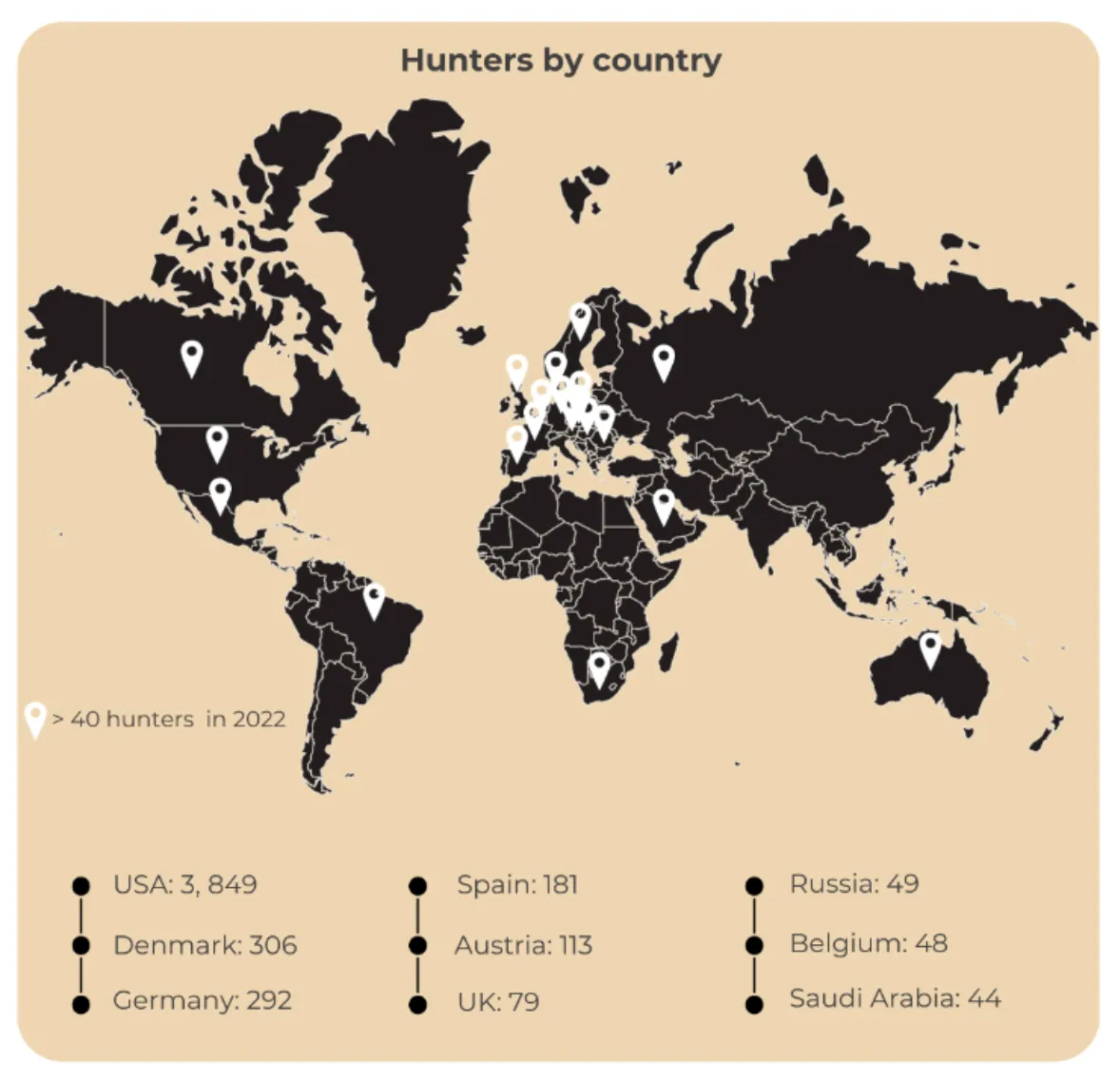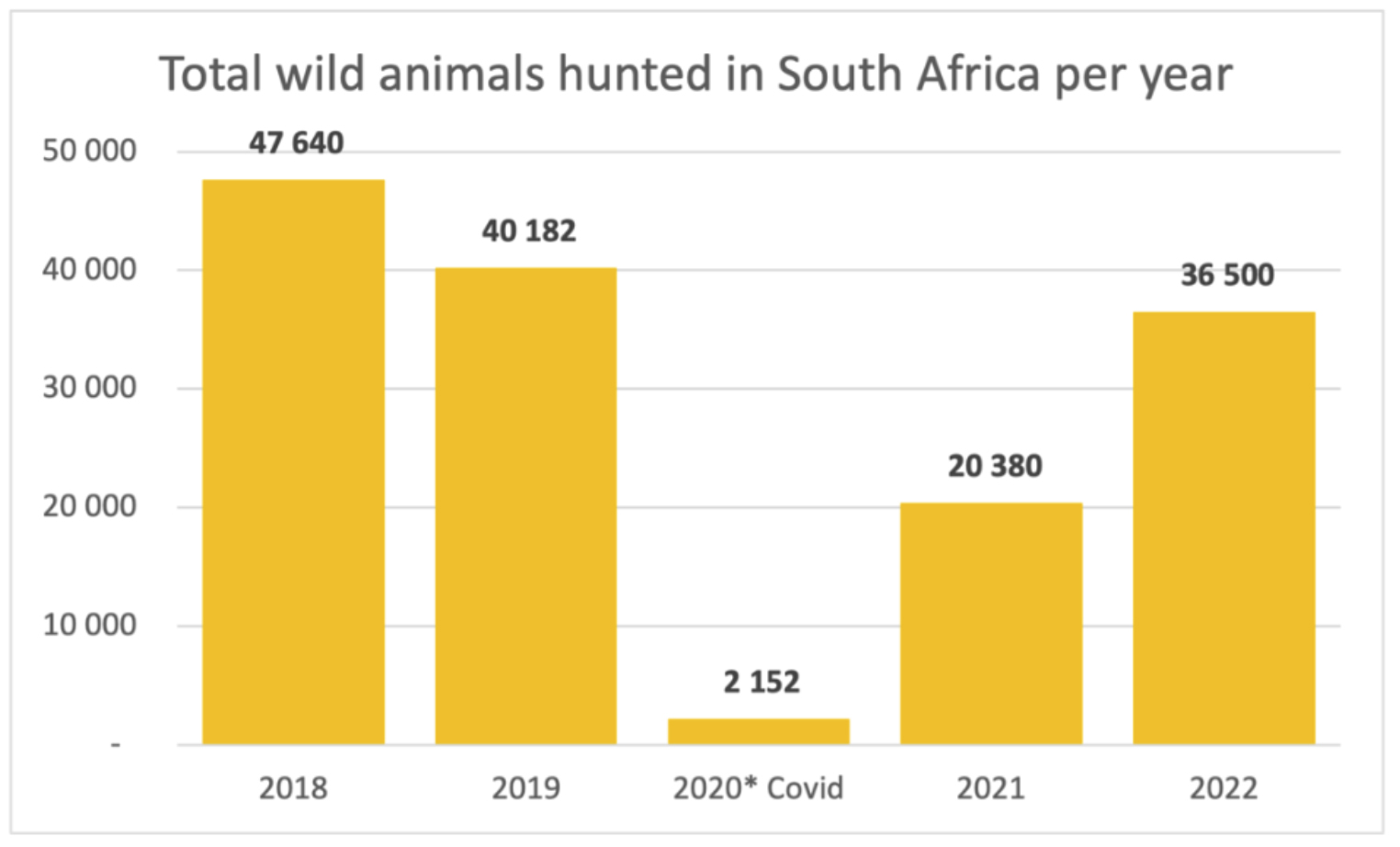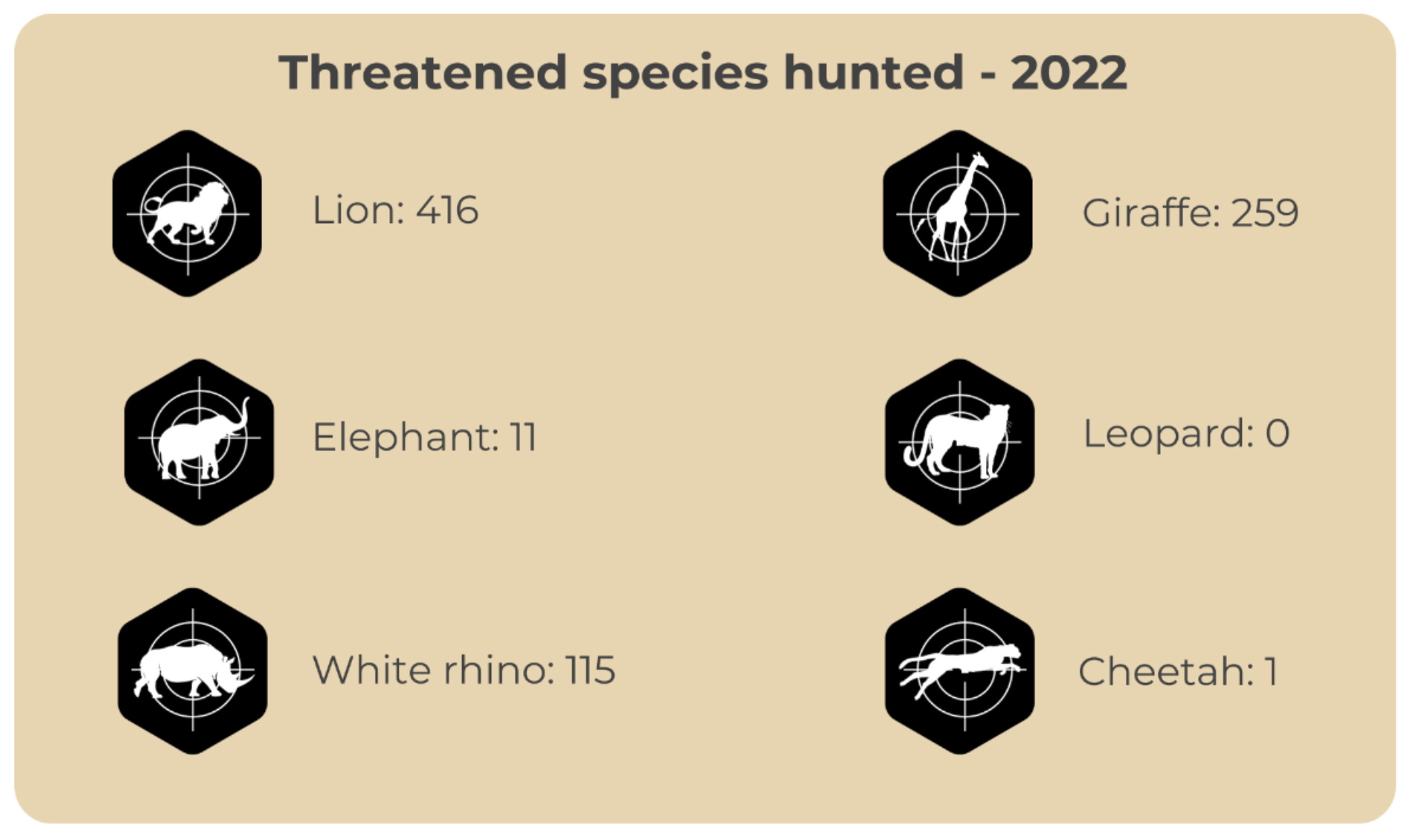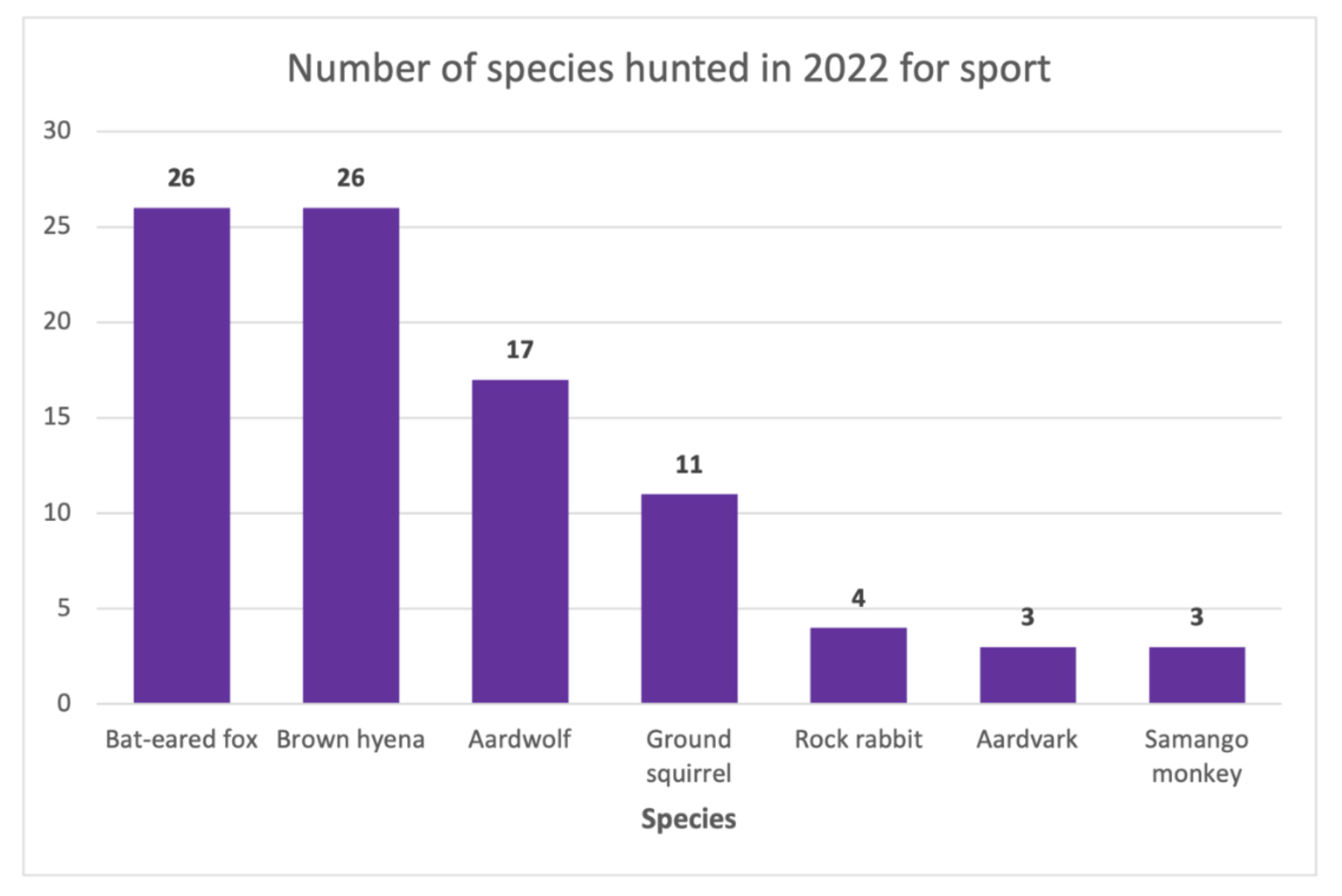When the Department of Forestry, Fisheries and Environment (DFFE) was asked by an MP in two Parliamentary questions to supply the 2022 hunting statistics, as they have done in the past, they declined. It was eventually forced to do so using a Protection of Information Act (Paia) request. This lack of transparency raises a number of questions.
Is Minister Barbara Creecy trying to shield the industry from the worldwide abhorrence against trophy hunting and its colonial legacy which threatens Brand South Africa? Or is it to protect an industry that shows no signs of transformation and offers little local community benefit? Could it be to conceal the demographic of international trophy hunters entering South Africa?
Trophy hunting must be one of the least “transformed” industries in the country. In answer to a parliamentary question in 2022 by Minister Creecy, only 101 (4%) of 2,786 registered professional hunters may be categorised as previously disadvantaged individuals.
According to professional hunting statistics, most hunters are predominantly wealthy westerners.
For those who facilitate the hunting of South Africa’s wild animals, however, it’s a very lucrative industry. Despite worldwide disfavour, wealthy international trophy hunters still flock to South Africa to kill from the iconic to the unknown, indigenous to exotic, and often endangered animals. Of 6,242 international hunters 3,849 (62%) were American, with smaller numbers from European nations, including Denmark, Spain, and Germany.

The professional hunting statistics from 2022 paint a disturbing picture of the number and variety of animals shot by international trophy hunters (only) during 2022 with a total of 36,500 animals shot by 6,242 clients.

The animals hunted did not include only typical Big Five, but included several small and rarely seen creatures that stand no chance against rifles and bows. These include servals, suricates, genets and mongoose. Nearly 200 bat-eared and Cape foxes were also hunted. Four black-footed cats fetched a mere $100 each — an animal so rarely seen that many wildlife lovers and photographers would pay dearly to see one, if for just a moment, in the wild.


Despite increasing concern for our threatened and vulnerable species, 115 white rhinos (listed as a near-threatened species) were hunted, compared to 56 in 2021, for an average price tag of $31,500 each, a slap in the face of the anti-poaching teams who risk their lives to keep rhinos alive for a lot less money. The hunting of 115 rhinos for trophies is all the more disturbing given that 451 rhinos were poached in 2021 and 448 in 2022.
Notwithstanding universal condemnation of South Africa’s captive lion industry and official policy to shut this down, 395 lions were killed in 2021 and 416 in 2022, with a decreased price tag of $15,000 to $11,625 each. Research conducted by Blood Lions and World Animal Protection demonstrates that 1,572 captive-bred lions were hunted between 2017 and 2020 with the North West conservation authorities issuing the majority of permits at 1,544 (90,5%).
Trophy hunting remains a contentious issue among conservationists, animal welfare groups and the hunting lobby, but it required renewed scrutiny with the recent acceptance of the White Paper on Conservation and Sustainable Use of South Africa’s Biodiversity. This aspirational new vision includes “an inclusive, transformed society living in harmony with nature, where biodiversity conservation and sustainable use ensure healthy ecosystems, with improved benefits that are fairly and equitably shared for present and future generations”.
Until now, South Africa’s history of conservation has been based on archaic, colonial thinking that secured protected land through forced removals and exclusion and a “fences and fines” approach that vilified the poacher while celebrating the hunter, an approach that is still prevalent. So the White Paper is notable in seeking a new take on conservation from a legislative and historical perspective and begs two questions: does trophy hunting have a place in a progressive, equitable and harmonious vision of protecting biodiversity; and is the notion of trophy hunting as sustainable use and protection of biodiversity a cover story for its excessive consumption?
Job creation is frequently cited as an important benefit of trophy hunting in rural communities, yet closer investigation by environmental economist Ross Harvey demonstrates that such jobs are seasonal compared to year-round tourism and he points to possible damages to ecotourism caused by the trophy hunting of animals sought by tourists.
Read more in Daily Maverick: SA’s ‘R3.4-billion’ hunting industry – should a simple tourist levy replace recreational hunts?
Another question, given that biodiversity is under increasing threat: are hunting revenues being re-invested into its protection and genuinely sustainable use?
It is claimed by hunters that they protect wildlife and contribute to local communities. Aside from the troubling notion that wealthy Western hunters are the only true guardians of the environment and poor communities, do these claims hold up?
In 2022 Minister Creecy responded to a parliamentary question on income generated from trophy hunting in 2019. She said R208-million (out of a total of R1.1-billion for all types of hunting) was derived from the trophy hunting of threatened or endangered species.
However, her department was unable to provide a breakdown of where the money went as there’s no legal requirement for hunting outfitters to report these figures. Following a Paia request regarding community benefits, the department added that “these records do not exist” and “there is no legal requirement compelling the department to keep the details of expected community benefit and revenue”.
Dr Mucha Mkono of the University of Queensland Business School in Brisbane, Australia, who conducted a study in 2019 on African social media users’ attitudes towards trophy hunting, found a strong sense of resentment towards privileged Western tourists having more access to wildlife than local citizens. Notably, trophy hunting was considered a neo-colonial form of tourism.
According to Mkono, “the very underdeveloped status of many of the rural areas where hunting occurs tells us what we need to know. The benefits are not trickling down enough to make a real difference in the local communities. Whatever benefits there are, their scope fails to justify the ethical and environmental cost”.
University of Cape Town researcher Dr Femke Brandt found in 2015 that no significant change has occurred in the redistribution of wealth between land owners and farm workers in the transition of land from farming to wildlife. Their employment remains based on minimum wage earning and the individual discretion of each land owner. There is added danger of living and working on a wildlife farm with little to no protection and employee benefits.
The upshot is that arguments used to justify the economic and social benefits of trophy hunting in South Africa remain weak and a lack of transparency still favours a colonial sport for the privileged few. DM
Note: Answers to Parliamentary questions may be provided upon request as the official DFFE website and Parliamentary Monitoring Group have not posted the answers referred to above.
This article was provided by the Conservation Action Trust.

















 Become an Insider
Become an Insider
Ignorance is bliss. Stop the farming of wildlife and see how quickly the natural population disappears.
Indeed. When emotion becomes the driving force, facts become blurred. Lots of information on number of animals hunted with no reference to population sizes and increase over the past couple of decades.
We humans cannot exist without exploiting our environment – even Dr Klarmann’s own University, the whole of Johannesburg and all other urban development, stands where elephants and rhinos once grazed. What “harmony”?
The “natural world” is where we get all of our resources, animal, vegetable, mineral or farmed, and obtaining those resources is by definition uncivilised. That’s why civilised people, especially animal rights advocates, hate it. However, they consume the products, and animal rights don’t exist. Ask any prey animal.
The number of wild animals in SA has jumped 36-fold from 557,000 since the SA Model (SAM), gave value to the animals (Bloomberg), and it still increases their number, upsetting the world’s Marxists. By contrast, Kenya banned hunting 30 years ago and has lost 80% of its megafauna (KWCA).
More land and wild animals are conserved under SAM than all SANparks. Only 1:10 SANparks make a profit – there are simply not enough tourists, so raising wildlife for meat under SAM is excellent taxpaying use for marginal land. The alternative is cattle and no wildlife.
37,000 sounds like a lot but a million animals (est.) are killed for food and another 3 million (including birds) shot as pests annually. Why throw the few skins and horns away? Better sell them to rich tourists – the animals are meat anyway.
Community game farms for Previously Disadvantaged Black South Africans, are plagued with problems. Today’s disadvantaged are rural Afrikaners?
Good insight John
I agree completely with the comments so far, especially about ignorance regarding the hunting industry…
It is very unfortunate that many well meaning people allow themselves to be sucked into the narrow picture created by sentimental writing, bearing no relationship to the reality on the ground.
It is also interesting to examine the roots, background and financial circumstances of the people complaining about hunting …… they are generally very comfortable and live close to a Woolies or Spar.
I mean no offence in saying this, it is just a reality which helps cloud their judgement and views…..generally armchair stuff.
Without game farms, normal farms with game, official hunting areas and private reserves there would be only a fraction of the current game population in South Africa……..the reality is that all this costs money and it has to be earned somehow to pay for survival of the game on those properties. It is impossible to do this only from conventional Wildlife Tourism and the Governments of Africa cannot afford to do it. Private owners can. A classic example is the Rhino situation. Rhino are a financial liability to most people who own them and many, many entities have given up keeping them due to the extreme cost…….I am still involved with Rhino and I can attest to that.
The greater good is served by Conservation, in all its forms, not by Preservation, which today cannot work , other than in very specific and limited areas.
Hunting is a huge part of Conservation that transfers the financial responsibility of protecting huge areas of Wildlife Range to the Private Sector………People have different view and ideas and forcing in one way or another, views and opinions on others, is not ideal……. this is happening far too much with far too many idealistic attitudes today.
Spot on about the activists and protesters, same just about everywhere, look at Just Stop Oil, Extinction Rebellion, Greenpeace, PETA and just about every environmental/climate crisis/animal activist etc etc everywhere, they’re all well off, many retired or bored middle class hippy wannabe’s, trust fund kids and students supported by their well-off families and all seeking attention for things they know nothing about.
The sad reality is that these self proclaimed “guardians of the galaxy” are hurting true activists, animal welfare workers and conservationists as now most people dismiss all activist/protests/movements out of hand as just sad, selfish attention seeking muppets that don’t have a life and love the sound of their own voices
I agree completely with the comments so far, especially about ignorance regarding the hunting industry…
It is very unfortunate that many well meaning people allow themselves to be sucked into the narrow picture created by sentimental writing, bearing no relationship to the reality on the ground.
It is also interesting to examine the roots, background and financial circumstances of the people complaining about hunting …… they are generally very comfortable and live close to a Woolies or Spar.
I mean no offence in saying this, it is just a reality which helps cloud their judgement and views…..generally armchair stuff.
Without game farms, normal farms with game, official hunting areas and private reserves there would be only a fraction of the current game population in South Africa……..the reality is that all this costs money and it has to be earned somehow to pay for survival of the game on those properties. It is impossible to do this only from conventional Wildlife Tourism and the Governments of Africa cannot afford to do it. Private owners can. A classic example is the Rhino situation. Rhino are a financial liability to most people who own them and many, many entities have given up keeping them due to the extreme cost…….I am still involved with Rhino and I can attest to that.
The greater good is served by Conservation, in all its forms, not by Preservation, which today cannot work , other than in very specific and limited areas.
Hunting is a huge part of Conservation that transfers the financial responsibility of protecting huge areas of Wildlife Range to the Private Sector………People have different view and ideas and forcing in one way or another, views and opinions on others, is not ideal……. this is happening far too much with far too many idealistic attitudes today.
Simply put: the politics of envy at it yet again.
The irony is that the lady is a conservation psychologist. Whatever that is. But her article headline uses words like “privilaged”, “colonial” etc, but she com0letely ignores a consequence of a hunting ban and the loss of livelihoods to some poor rural folk whom she has never met.
This article appeals to a largely emotional ignorant public who are utterly clueless about the nuances of conservation.
I actually can’t believe the effort gone to concoct this article.
The evidence of the success that policy of sustainable use has offered is to miss. The writer here must harbor some serious bias and have blinkers with rose tinted glasses.
One only has to Google game farms for sale to see how many farms have game and that they sell at a premium. Without the animals offering a value, what would happen to those animals?
Ironically the privilaged author who is studying some useless degree is taking the moral highground against a wildlife economy that employs thousands of people from all walks of life. She would de better to argue that alchohol is bad for you and that we should shut down all bottle stores.
The mind boggles that the DM allow unqualified people to regurgitate these horribly biased and concocted falsehoods.
Kill the last rhino so you can save the second last one. This is the mindless kind of logic of those who support trophy hunting nothing less than blood lust (certainly not a sport) to appease the lowest of the low human traits. If you are going to eat what you shoot it is kind of ok but shooting a lion for what? So you can brag you shot a lion with your friends? I thought there was a bit more to human intelligence than this